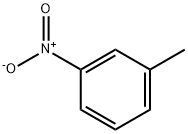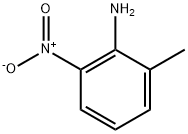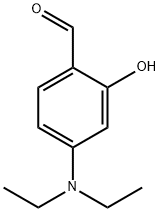A6158912
m-Nitrotoluene , Analysis standard , 99-08-1
Synonym(s):
1-Methyl-3-nitrobenzene
CAS NO.:99-08-1
Empirical Formula: C7H7NO2
Molecular Weight: 137.14
MDL number: MFCD00007265
EINECS: 202-728-6
Update time: 2022-07-08
PRODUCT Properties
| Melting point: | 15 °C |
| Boiling point: | 230-231 °C(lit.) |
| Density | 1.157 g/mL at 25 °C(lit.) |
| vapor density | 4.73 (vs air) |
| vapor pressure | 1 mm Hg ( 50.2 °C) |
| refractive index | n |
| Flash point: | 215 °F |
| storage temp. | 2-8°C |
| solubility | 0.419g/l |
| form | Liquid |
| color | Clear yellow to yellow-brownish |
| explosive limit | 2.2%(V) |
| Water Solubility | insoluble |
| Merck | 14,6650 |
| BRN | 1906910 |
| Henry's Law Constant | 9.31 at 25 °C (thermodynamic method-GC/UV spectrophotometry, Altschuh et al., 1999) |
| Exposure limits | NIOSH REL: TWA 2 ppm (11 mg/m3), IDLH 200 ppm; OSHA PEL: TWA 5
ppm (30 mg/m3); ACGIH TLV: TWA 2 ppm (adopted). |
| Dielectric constant | 23.800000000000001 |
| Stability: | Stable. Combustible. Incompatible with reducing agents, strong oxidizing agents, strong bases. |
| LogP | 2.4 |
| Surface tension | 41.4mN/m at 20°C |
| CAS DataBase Reference | 99-08-1(CAS DataBase Reference) |
| IARC | 3 (Vol. 65) 1996 |
| NIST Chemistry Reference | Benzene, 1-methyl-3-nitro-(99-08-1) |
| EPA Substance Registry System | m-Nitrotoluene (99-08-1) |
Description and Uses
3-Nitrotoluene is mainly used in organic synthesis as an intermediate for pesticides, dyes, explosives, medicines, color developers, plastics, synthetic fibers and auxiliaries.
Safety
| Symbol(GHS) |    GHS07,GHS08,GHS09 |
| Signal word | Warning |
| Hazard statements | H302-H373-H411 |
| Precautionary statements | P260-P264-P270-P273-P301+P312-P314 |
| Hazard Codes | T,F,Xn |
| Risk Statements | 23/24/25-33-51/53-36/37/38-11-36-20/21/22 |
| Safety Statements | 36/37-45-61-37-28A-27-16-26 |
| RIDADR | UN 1664 6.1/PG 2 |
| OEB | A |
| OEL | TWA: 2 ppm (11 mg/m3) [skin] |
| WGK Germany | 2 |
| RTECS | XT2975000 |
| TSCA | Yes |
| HazardClass | 6.1 |
| PackingGroup | II |
| HS Code | 29042000 |
| Hazardous Substances Data | 99-08-1(Hazardous Substances Data) |
| Toxicity | Acute oral LD50 for guinea pigs 3,600 mg/kg, mice 330 mg/kg, rats 1,072 mg/kg, rabbits 2,400 (quoted, RTECS, 1985). |




